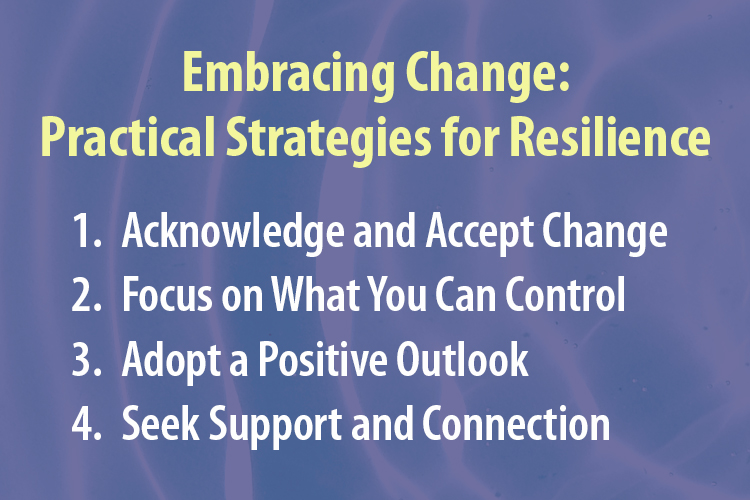When confronted with the inevitable shifts that come with aging, we often find ourselves feeling a loss of control and routine. Change is a natural part of life, but when it touches the lives of older adults or involves navigating the transition to senior living, it can evoke feelings of uncertainty, fear, and helplessness.
At Clermont Park in Denver, Colorado, we understand that facing change – whether it involves health, living arrangements, or daily routines – can impact your mental health. That’s why we’re committed to providing empowering support and guidance to help you navigate change with confidence.
Why Navigating the Transition to Senior Living Can Feel So Challenging
As we age, our ability to adapt to change can diminish. Routine provides comfort and stability, especially for seniors who may have relied on familiar patterns for years.
When navigating the transition to senior living, we often experience a number of changes in our daily lives. Downsizing, getting settled in a new community, adjusting to a new routine, or experiencing personal changes that may have prompted a move – such as health concerns, mobility issues, or the need for different living arrangements – all can trigger a sense of loss of control. This can lead to resistance, anxiety, or even depression.
Understanding that these feelings are common when faced with change is the first step toward overcoming it. Recognizing your feelings allows you to adjust with compassion and resilience rather than resistance and frustration.
Embracing Change: Practical Strategies for Resilience
At Clermont Park, we believe that embracing change involves a mindset shift. It’s about turning perceived obstacles into opportunities for growth and connection.
Here are some practical ways to navigate change effectively:

Acknowledge and Accept the Reality of Change
Many individuals resist change because they fear the unknown. However, avoiding or denying change only prolongs stress. Instead, practice accepting that change is part of life. Acceptance reduces anxiety and opens the door to proactive planning, whether it’s exploring new living options or adjusting daily routines.
Focus on What You Can Control
When faced with change, it’s easy to feel overwhelmed by factors outside of your influence. Resilient individuals concentrate on what they can control – namely, their attitudes, responses, and outlooks.
For example, choosing to maintain a positive attitude or practicing gratitude can significantly impact emotional well-being. It is helpful to recognize that when you’re facing change, controlling your responses is empowering and can lead to greater peace of mind.
Adopt a Positive Outlook
Every transition presents a choice: dwell on what’s lost, or focus on what new opportunities lie ahead. Cultivating a positive mindset doesn’t mean ignoring challenges, but rather approaching them with hope, curiosity, and resilience.
For seniors considering a move to independent or assisted living, this mindset can transform a perceived loss into a chance for new social connections, enriched activities, and enhanced safety.
Seek Support and Connection
You don’t need to face change alone. Reaching out for support – whether from family, friends, support groups, or professional counseling – is a sign of resilience. Sharing feelings and fears can alleviate loneliness and foster a sense of community.
When navigating change, support networks are invaluable for emotional strength and practical assistance.
When is the Right Time to Consider Senior Living?
 Deciding when to transition to a senior living community is a pivotal step. A few of the indicators that you may be ready to consider a move include:
Deciding when to transition to a senior living community is a pivotal step. A few of the indicators that you may be ready to consider a move include:
- Wanting to spend less time on home maintenance
- Looking to forge new friendships and connections
- Interested in participating in enriching, purpose-driven programs
- Seeking a community that secures access to additional care options
Moving to a life plan community like Clermont Park offers numerous benefits: low-maintenance living, vibrant social activities, access to health services, a continuum of care for future needs, and a supportive environment designed specifically for seniors.
It’s not just about relocating – it’s about embracing a lifestyle that promotes independence, safety, and well-being.
Again, while change can be overwhelming, it can also be a catalyst for positive transformation. Moving to a community that understands your needs can restore your sense of control and provide the social engagement that keeps you active and fulfilled.
Embrace the Transition to Senior Living as an Opportunity to Thrive
 Change, especially in later years, can be viewed as an opportunity rather than a setback. It allows for new routines, fresh relationships, and renewed purpose. At Clermont Park, our mission is to help seniors and their families see transitions as steps toward thriving rather than just surviving.
Change, especially in later years, can be viewed as an opportunity rather than a setback. It allows for new routines, fresh relationships, and renewed purpose. At Clermont Park, our mission is to help seniors and their families see transitions as steps toward thriving rather than just surviving.
If you’re contemplating a move or need help navigating a significant change, we’re here for you. Our community offers comprehensive services, including adult day programs, assisted living, and supportive care options, tailored to meet your unique needs.
We understand that when you’re faced with change, support and reassurance can make all the difference.
Take the Next Step To Senior Living
If you or your loved one are considering a transition to senior living, don’t hesitate to reach out. Clermont Park is dedicated to providing opportunities for continued growth to help you thrive in this new chapter.
Contact us today to learn more about our welcoming community and how we can support you on this journey. Remember, even in the face of change – you are not alone! We’re here to help you rediscover strength, independence, and purpose.




